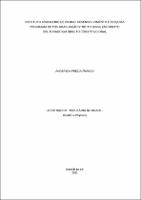Use este identificador para citar ou linkar para este item:
https://repositorio.idp.edu.br//handle/123456789/4674| Título: | Arbitragem tributária no Brasil: Desafios e Propostas |
| Autor(es): | Franco, Anderson Prezia |
| Orientador(es): | Côrtes, Osmar Mendes Paixão |
| Palavras-chave: | Arbitragem tributária;Acesso à Justiça;Poder Judiciário;Sistema Tributário Brasileiro |
| Data de submissão: | 2023 |
| Editor: | Instituto Brasileiro de Ensino, Desenvolvimento e Pesquisa |
| Citação: | FRANCO, Anderson Prezia. Arbitragem tributária no Brasil: Desafios e Propostas. 2023. 170 f. Tese (Doutorado em Direito Constitucional) - Instituto Brasileiro de Ensino, Desenvolvimento e Pesquisa, Brasília, 2023. |
| Resumo: | O objetivo geral desta tese é investigar a Arbitragem Tributária no direito brasileiro e seus efeitos
sociojurídicos para a Justiça no Brasil. A partir disso, o estudo percorre os seguintes objetivos
específicos: a) descrever o processo histórico-social de constitucionalização da Arbitragem
tributária no Brasil e o cenário jurídico-político sobre o tema; b) identificar e problematizar o
Sistema Tributário brasileiro, a partir do princípio do acesso à Justiça, com ênfase para as
possíveis crises do processo tributário no Poder Judiciário brasileiro; c) refletir sobre a
experiência portuguesa na adoção da Arbitragem tributária e, de modo subsidiário, d) propor
interlocuções para o caso brasileiro, a partir da análise qualitativa dos documentos dos projetos
de lei em trâmite no Senado Federal sobre o tema. Esta pesquisa parte da hipótese de que a
Arbitragem Tributária no direito brasileiro tende a ampliar o acesso à Justiça, evitando que o
processo judicial, sobretudo na fase de execução fiscal, repita etapas e providências realizadas
pela administração fazendária ou pelo conselho de fiscalização profissional (CNJ, 2021). A
metodologia adotada consiste na revisão bibliográfica sobre o tema, bem como na análise
documental dos Projetos de Lei n. 4257/19 e 4469/20, de autoria do senador Antônio Anastasia
e da Senadora Daniella Ribeiro (PP/PB), respectivamente; do Projeto de Lei Complementar -
PLP - n. 17/2022, apresentado pelo deputado Felipe Rigoni, em conjunto com outros 31
parlamentares; e da Recomendação n. 120/2021 do Conselho Nacional de Justiça - CNJ. |
| Abstract: | The general objective of this thesis is to investigate Tax Arbitration in Brazilian law and its socio legal effects for Justice in Brazil. From this, the study covers the following specific objectives: a) to describe the historical-social process of constitutionalization of tax arbitration in Brazil and the legal-political scenario on the subject; b) identify and problematize the Brazilian Tax System, based on the principle of access to Justice, with emphasis on possible crises in the tax process in the Brazilian Judiciary; c) reflect on the Portuguese experience in the adoption of tax arbitration and, in a subsidiary way, d) propose interlocutions for the Brazilian case, based on the qualitative analysis of the documents of bills pending in the Federal Senate on the subject. This research is based on the hypothesis that Tax Arbitration in Brazilian law tends to expand access to Justice, preventing the judicial process, especially in the tax execution phase, from repeating steps and measures taken by the tax administration or by the professional inspection council (CNJ, 2021). The methodology adopted consists of a bibliographic review on the subject, as well as a document analysis of Bills 4257/19 and 4469/20, authored by Senator Antônio Anastasia and Senator Daniella Ribeiro (PP/PB), respectively; of the Complementary Law Project - PLP - n. 17/2022, presented by deputy Felipe Rigoni, together with 31 other parliamentarians; and Recommendation No. 120/2021 of the National Council of Justice - CNJ. |
| URI: | https://repositorio.idp.edu.br//handle/123456789/4674 |
| Aparece nas coleções: | Doutorado Acadêmico em Direito Constitucional |
Arquivos associados a este item:
| Arquivo | Descrição | Tamanho | Formato | |
|---|---|---|---|---|
| Tese_ANDERSON PREZIA FRANCO_Doutorado_2023.pdf | 1.15 MB | Adobe PDF |  Visualizar/Abrir |
Os itens no repositório estão protegidos por copyright, com todos os direitos reservados, salvo quando é indicado o contrário.
